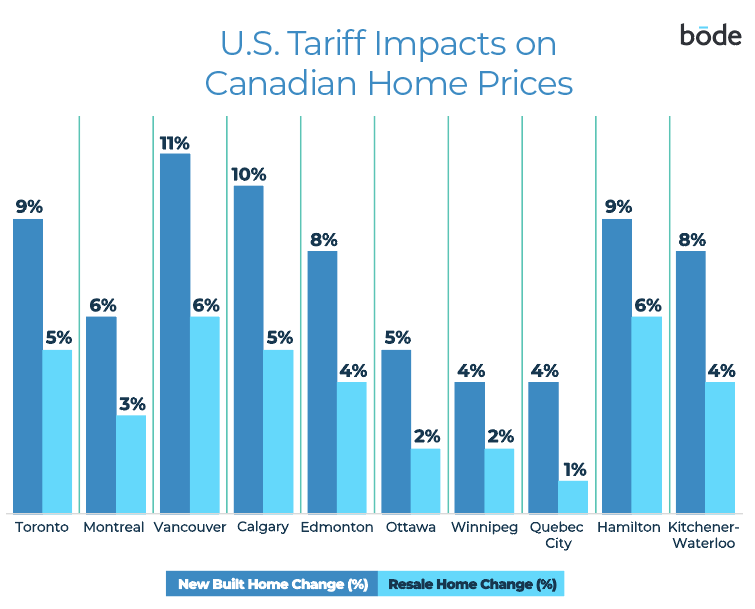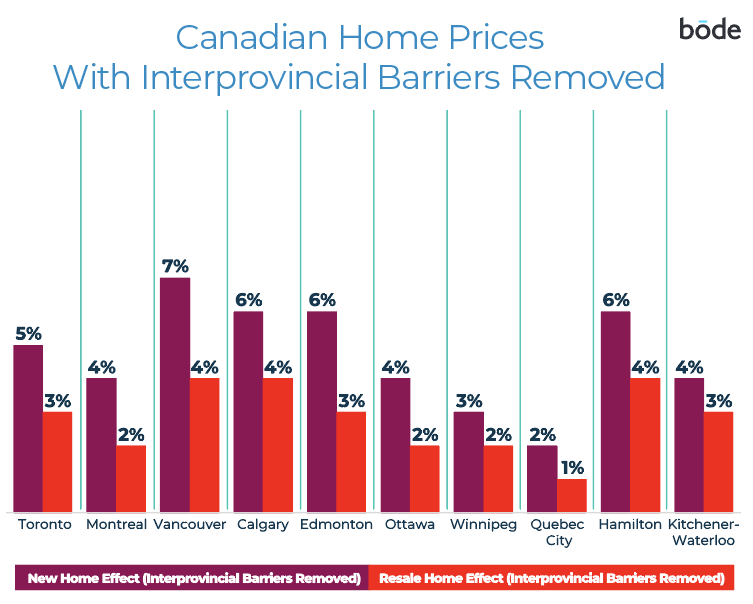
The recent election of Mark Carney as Prime Minister represents a critical opportunity for Canada to strengthen its economic resilience, particularly amid escalating trade tensions with the United States. Central to Carney’s agenda must be the immediate pursuit of interprovincial harmonization—a timely reform capable of significantly mitigating the economic impacts of intensifying U.S. tariffs on Canadian steel, aluminum, and softwood lumber.
Even before the onset of recent trade disputes, Canada’s real estate market faced chronic housing supply shortages and affordability issues. These longstanding challenges are now significantly exacerbated by rising construction costs driven by American-imposed tariffs. Canada’s fragmented provincial regulations have historically heightened inefficiencies, restricted labor mobility, and inflated construction and development costs nationwide.
A recent analysis completed by our team illustrates that U.S. tariffs could push new home prices in Canada upward by between 4.7% and 6.3%, significantly exacerbating affordability challenges. However, eliminating provincial trade barriers could go a long ways towards mitigating these tariff impacts, driving down material costs, accelerating construction, and unlocking critical labor mobility. Streamlined regulations would spur competition, enhance efficiency, and strengthen investment confidence—directly benefiting Canada’s already robust home-building sector.

International benchmarks highlight the substantial benefits of harmonization. For instance, the European Union’s adoption of harmonized construction standards has notably reduced construction costs and accelerated cross-border investments, directly contributing to housing affordability and economic stability across member nations.
Canada’s home-building sector is well-positioned to similarly benefit. Clearer and unified regulations would attract increased private sector investment, fostering innovation in construction methods, scaling production, and rapidly meeting housing demand. This influx of private capital, alongside streamlined regulatory frameworks, would stimulate job creation, and stabilize housing markets.
Proptech firms like Bōde further exemplify the transformative potential of national fundamentally sound efficiency drivers. By leveraging advanced digital technologies and transparent, data-driven insights, Bōde empowers homeowners and buyers, substantially reducing transaction costs and accelerating project timelines. Such marketplace efficiency is vital in the face of current economic pressures and precisely the competitive edge Canada needs to thrive globally and fortify domestic resilience.

Recent data underscores the urgency of harmonization: provinces operating independently incur substantially higher cost burdens, whereas harmonization demonstrably reduces tariff-driven price escalations. This positive impact is especially notable in major markets like Ontario and British Columbia, where rapid urbanization and high demand has historically intensified affordability issues.
Canada stands at a critical juncture. Proactive federal leadership toward swift, strategic interprovincial harmonization will protect Canadian homeowners, stabilize the real estate sector, and position Canada as a resilient economic leader globally. The imperative for immediate action—driven by unlocking private sector innovation and decisive government policy—is clear. The moment to act decisively is now.
Robert Price is the Chief Executive of Bōde, a top 40 under 40 winner by Avenue Magazine and Director of the Invest Alberta Council.




Leave a Reply